How Not to Procrastinate
如何拒绝拖延症英语作文简单

如何拒绝拖延症英语作文简单英文回答:Procrastination is a common problem that many people struggle with. It can be difficult to overcome, but with the right strategies and mindset, it is possible to break free from this habit. Here are some tips on how to reject procrastination and become more productive.One effective way to combat procrastination is to set clear goals and deadlines for yourself. By breaking down your tasks into smaller, manageable chunks and assigning specific deadlines to each of them, you create a sense of urgency and accountability. This helps to prevent you from putting off your work until the last minute. For example, if you have a research paper to write, you can set a goal to complete the outline by the end of the day and allocate specific time slots for each section.Another strategy is to eliminate distractions. Intoday's digital age, it is easy to get sidetracked bysocial media, emails, and other forms of entertainment. To avoid falling into this trap, try turning off notifications on your phone or computer, or even temporarilydisconnecting from the internet. Find a quiet and dedicated space where you can focus solely on your work. Byminimizing distractions, you can stay focused and be more productive.Additionally, it can be helpful to break up your work into smaller, more manageable tasks. When faced with alarge and daunting task, it is easy to feel overwhelmed and put it off. However, by breaking it down into smaller steps, it becomes more approachable and less intimidating. For instance, if you have a presentation to prepare, you can start by brainstorming ideas, then create an outline, and finally work on each slide one by one. By taking it onestep at a time, you can make progress and avoid thetendency to procrastinate.Furthermore, it is important to cultivate a positive mindset and motivation. Procrastination often stems from alack of interest or enthusiasm for the task at hand. To overcome this, try to find ways to make the task more enjoyable or meaningful. For example, if you are dreading cleaning your room, you can turn on some upbeat music or invite a friend to help you. By finding ways to make the task more enjoyable, you can increase your motivation and reduce the urge to procrastinate.In conclusion, overcoming procrastination requires setting clear goals and deadlines, eliminating distractions, breaking tasks into smaller steps, and cultivating apositive mindset. By implementing these strategies, you can reject procrastination and become more productive in your daily life.中文回答:拖延症是许多人都面临的一个普遍问题。
打败拖延症 How to Stop Procrastinating
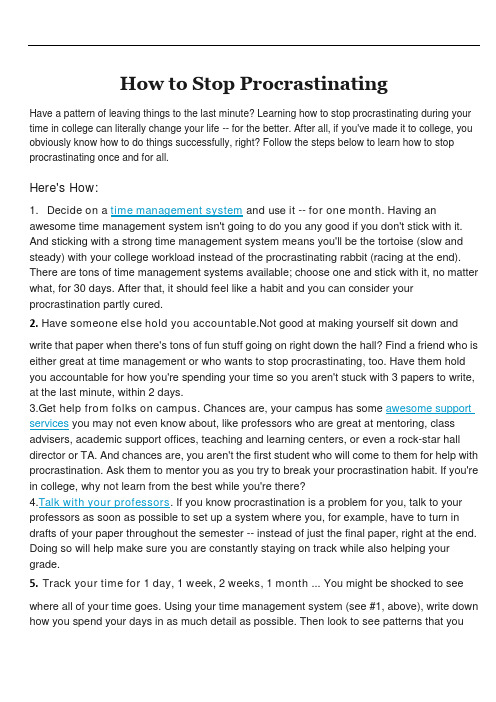
How to Stop ProcrastinatingHave a pattern of leaving things to the last minute? Learning how to stop procrastinating during your time in college can literally change your life -- for the better. After all, if you've made it to college, you obviously know how to do things successfully, right? Follow the steps below to learn how to stop procrastinating once and for all.Here's How:1.Decide on a time management system and use it -- for one month. Having an awesome time management system isn't going to do you any good if you don't stick with it. And sticking with a strong time management system means you'll be the tortoise (slow and steady) with your college workload instead of the procrastinating rabbit (racing at the end). There are tons of time management systems available; choose one and stick with it, no matter what, for 30 days. After that, it should feel like a habit and you can consider your procrastination partly cured.2. Have someone else hold you accountable.Not good at making yourself sit down andwrite that paper when there's tons of fun stuff going on right down the hall? Find a friend who is either great at time management or who wants to stop procrastinating, too. Have them hold you accountable for how you're spending your time so you aren't stuck with 3 papers to write, at the last minute, within 2 days.3.Get help from folks on campus. Chances are, your campus has some awesome support services you may not even know about, like professors who are great at mentoring, class advisers, academic support offices, teaching and learning centers, or even a rock-star hall director or TA. And chances are, you aren't the first student who will come to them for help with procrastination. Ask them to mentor you as you try to break your procrastination habit. If you're in college, why not learn from the best while you're there?4.Talk with your professors. If you know procrastination is a problem for you, talk to your professors as soon as possible to set up a system where you, for example, have to turn in drafts of your paper throughout the semester -- instead of just the final paper, right at the end. Doing so will help make sure you are constantly staying on track while also helping your grade.5.Track your time for 1 day, 1 week, 2 weeks, 1 month ... You might be shocked to seewhere all of your time goes. Using your time management system (see #1, above), write down how you spend your days in as much detail as possible. Then look to see patterns that you can help plan around as you aim to end your procrastination pattern. For example, do you usually spend 3 or 4 hours just hanging out once you return to your residence hall after classes finish? Realize that you probably need an hour or so to decompress -- and that after that, you might be better off heading to the library so you can get some study time in.。
如何阻止拖延症的英语作文
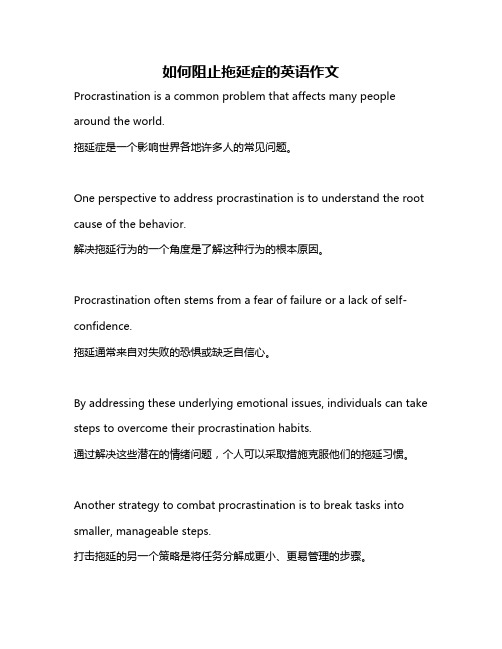
如何阻止拖延症的英语作文Procrastination is a common problem that affects many people around the world.拖延症是一个影响世界各地许多人的常见问题。
One perspective to address procrastination is to understand the root cause of the behavior.解决拖延行为的一个角度是了解这种行为的根本原因。
Procrastination often stems from a fear of failure or a lack of self-confidence.拖延通常来自对失败的恐惧或缺乏自信心。
By addressing these underlying emotional issues, individuals can take steps to overcome their procrastination habits.通过解决这些潜在的情绪问题,个人可以采取措施克服他们的拖延习惯。
Another strategy to combat procrastination is to break tasks into smaller, manageable steps.打击拖延的另一个策略是将任务分解成更小、更易管理的步骤。
This can make daunting tasks seem less overwhelming and reduce the temptation to procrastinate.这可以使令人生畏的任务变得不那么令人畏惧,并减少拖延的诱惑。
Setting specific, achievable goals and deadlines for each step can provide a clear roadmap for completion.为每一个步骤设定具体、可实现的目标和截止日期,可以为完成提供清晰的路线图。
如何拒绝拖延症英语作文简单
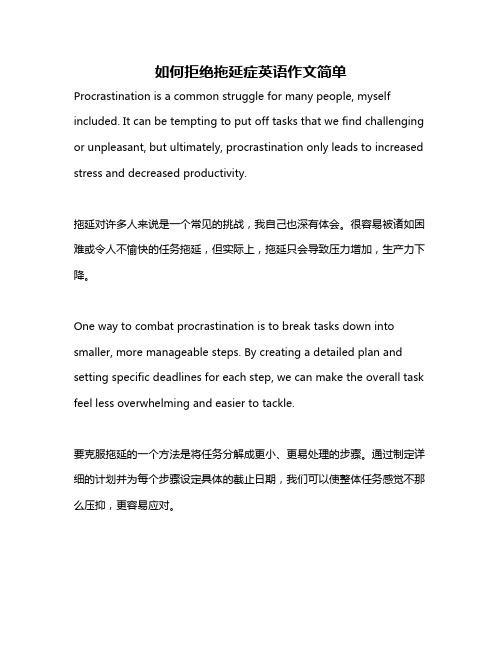
如何拒绝拖延症英语作文简单Procrastination is a common struggle for many people, myself included. It can be tempting to put off tasks that we find challenging or unpleasant, but ultimately, procrastination only leads to increased stress and decreased productivity.拖延对许多人来说是一个常见的挑战,我自己也深有体会。
很容易被诸如困难或令人不愉快的任务拖延,但实际上,拖延只会导致压力增加,生产力下降。
One way to combat procrastination is to break tasks down into smaller, more manageable steps. By creating a detailed plan and setting specific deadlines for each step, we can make the overall task feel less overwhelming and easier to tackle.要克服拖延的一个方法是将任务分解成更小、更易处理的步骤。
通过制定详细的计划并为每个步骤设定具体的截止日期,我们可以使整体任务感觉不那么压抑,更容易应对。
Another helpful strategy is to eliminate distractions. This could involve turning off your phone, finding a quiet place to work, or using apps that block time-wasting websites. By creating a focused work environment, we are less likely to succumb to the temptation of procrastination.另一个有帮助的策略是消除干扰。
怎样去克服拖延症英语作文
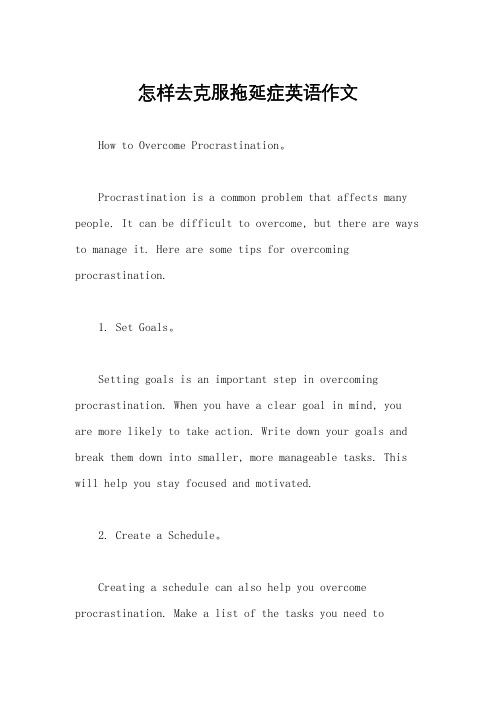
怎样去克服拖延症英语作文How to Overcome Procrastination。
Procrastination is a common problem that affects many people. It can be difficult to overcome, but there are ways to manage it. Here are some tips for overcoming procrastination.1. Set Goals。
Setting goals is an important step in overcoming procrastination. When you have a clear goal in mind, you are more likely to take action. Write down your goals and break them down into smaller, more manageable tasks. This will help you stay focused and motivated.2. Create a Schedule。
Creating a schedule can also help you overcome procrastination. Make a list of the tasks you need tocomplete and assign a specific time to each one. This will help you stay on track and avoid distractions.3. Use a Timer。
Using a timer can be a helpful tool when you are trying to overcome procrastination. Set a timer for a specific amount of time and work on a task until the timer goes off. This will help you stay focused and avoid distractions.4. Eliminate Distractions。
How to Defeat Procrastination in the New Semester?新学期如何战胜拖延症?
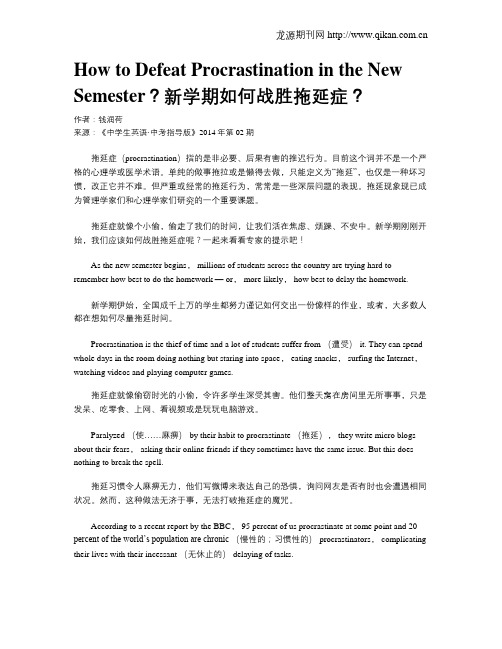
How to Defeat Procrastination in the New Semester?新学期如何战胜拖延症?作者:钱润荷来源:《中学生英语·中考指导版》2014年第02期拖延症(procrastination)指的是非必要、后果有害的推迟行为。
目前这个词并不是一个严格的心理学或医学术语。
单纯的做事拖拉或是懒得去做,只能定义为“拖延”,也仅是一种坏习惯,改正它并不难。
但严重或经常的拖延行为,常常是一些深层问题的表现。
拖延现象现已成为管理学家们和心理学家们研究的一个重要课题。
拖延症就像个小偷,偷走了我们的时间,让我们活在焦虑、烦躁、不安中。
新学期刚刚开始,我们应该如何战胜拖延症呢?一起来看看专家的提示吧!As the new semester begins, millions of students across the country are trying hard to remember how best to do the homework — or, more likely, how best to delay the homework.新学期伊始,全国成千上万的学生都努力谨记如何交出一份像样的作业,或者,大多数人都在想如何尽量拖延时间。
Procrastination is the thief of time and a lot of students suffer from (遭受) it. They can spend whole days in the room doing nothing but staring into space, eating snacks, surfing the Internet,watching videos and playing computer games.拖延症就像偷窃时光的小偷,令许多学生深受其害。
他们整天窝在房间里无所事事,只是发呆、吃零食、上网、看视频或是玩玩电脑游戏。
英语阅读解析:如何停止拖延症How to stop procrastinating

•time (时间) + line (线) • deadline
•dead (死亡) + line (线) • stop sb. from doing
• distraction 分散(注意力) • [反义词] attraction 吸引(注意力)
• be tempted to 受...诱惑
•Making a timeline with goals and deadlines is a great way to stop yourself from procrastinating. However, it is important to make your deadlines realistic so that you can be sure you’ll stick to them.
• 拖延症有时会发生在我们所有人的身上,不是吗?你要赶截 止时间,但你还不是在工作,而是在看社交软件,或者是上 网购物。这就叫做“拖延症”,它会影响着每一个人。因此, 如何才能停止拖延呢?
重点解析:
• It happens to all of us sometimes, doesn’t it? • 反义疑问句 • 它表示提问人的看法,没有把握,需要对方赞同。 • 由两部分组成:前一部分是一个陈述句,后一部分是一个 简短的疑问句 • 主要形式: • 陈述部分肯定式+疑问部分否定式 • 陈述部分否定式+疑问部分肯定式
•另外一个重要的因素是你的环境,不是吗?如果你 的工作环境常常分散注意力,你就会更容易有拖延 症。 你的工作环境有没有什么东西会让你分散注意 力的呢,比如电视?
如何克服拖延症高中英语作文
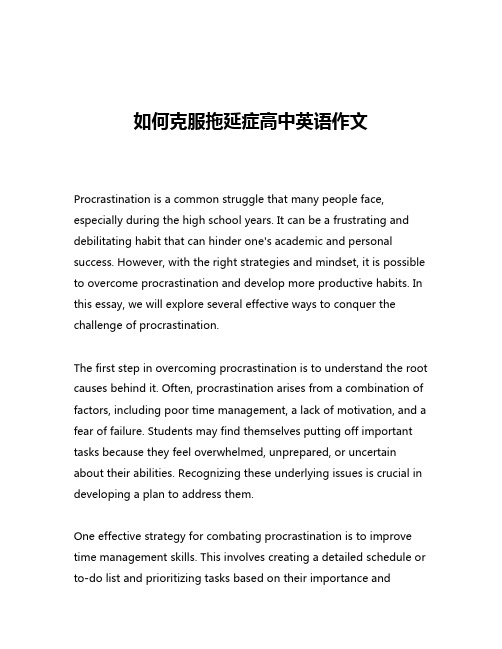
如何克服拖延症高中英语作文Procrastination is a common struggle that many people face, especially during the high school years. It can be a frustrating and debilitating habit that can hinder one's academic and personal success. However, with the right strategies and mindset, it is possible to overcome procrastination and develop more productive habits. In this essay, we will explore several effective ways to conquer the challenge of procrastination.The first step in overcoming procrastination is to understand the root causes behind it. Often, procrastination arises from a combination of factors, including poor time management, a lack of motivation, and a fear of failure. Students may find themselves putting off important tasks because they feel overwhelmed, unprepared, or uncertain about their abilities. Recognizing these underlying issues is crucial in developing a plan to address them.One effective strategy for combating procrastination is to improve time management skills. This involves creating a detailed schedule or to-do list and prioritizing tasks based on their importance anddeadlines. By breaking down larger projects into smaller, more manageable steps, students can feel less intimidated by the task at hand and be more likely to take action. Additionally, setting specific deadlines and holding oneself accountable can help maintain momentum and prevent procrastination.Another key aspect of overcoming procrastination is cultivating intrinsic motivation. Instead of relying solely on external factors, such as grades or parental expectations, students should strive to find genuine interest and personal relevance in their academic work. This can involve exploring topics that align with their passions, setting goals that are meaningful to them, or finding ways to make the learning process more engaging and enjoyable. When students are intrinsically motivated, they are more likely to stay focused and committed to their tasks.Closely related to motivation is the concept of self-efficacy, which refers to an individual's belief in their own abilities to accomplish a task. Students who struggle with procrastination often have low self-efficacy, believing that they are incapable of succeeding or that the task is too difficult to complete. By building confidence and a positive mindset, students can overcome these limiting beliefs and approach their work with a greater sense of self-assurance.One effective way to boost self-efficacy is through the use of positiveself-talk and affirmations. Instead of dwelling on negative thoughts or fears of failure, students should actively remind themselves of their strengths, past successes, and the progress they have made. This can help shift their mindset from one of doubt to one of empowerment and determination.In addition to developing stronger time management and motivation skills, it is also important for students to address the emotional and psychological factors that contribute to procrastination. Feelings of anxiety, stress, or perfectionism can often lead to avoidance behaviors and the tendency to put off important tasks. By learning stress management techniques, such as mindfulness, meditation, or deep breathing exercises, students can better regulate their emotions and maintain a more balanced and focused mindset.Furthermore, seeking support from others can be a valuable tool in overcoming procrastination. This can involve reaching out to teachers, guidance counselors, or trusted friends and family members who can provide encouragement, accountability, and practical advice. Joining a study group or participating in peer-to-peer mentoring programs can also help students feel more motivated and connected in their academic pursuits.It is important to note that overcoming procrastination is not a one-time fix, but rather an ongoing process that requires consistent effortand dedication. Students should be patient with themselves and recognize that setbacks and relapses are a natural part of the journey. By celebrating small victories and continually refining their strategies, they can gradually build the habits and mindset necessary to overcome procrastination and achieve their academic and personal goals.In conclusion, conquering procrastination is a multifaceted challenge that requires a combination of practical strategies and a shift in mindset. By addressing the underlying causes, improving time management and motivation, building self-efficacy, and seeking support from others, high school students can develop the tools and resilience needed to overcome this common obstacle. With persistence and a commitment to personal growth, they can unlock their full potential and experience greater academic and personal success.。
如何阻止拖延症的具体英语作文
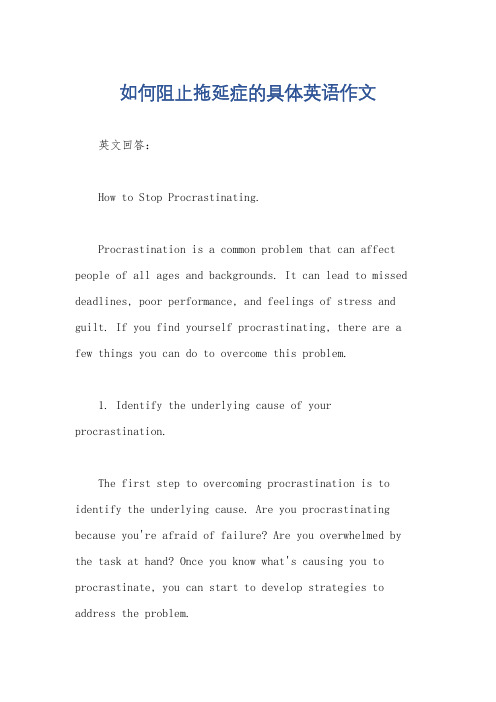
如何阻止拖延症的具体英语作文英文回答:How to Stop Procrastinating.Procrastination is a common problem that can affect people of all ages and backgrounds. It can lead to missed deadlines, poor performance, and feelings of stress and guilt. If you find yourself procrastinating, there are a few things you can do to overcome this problem.1. Identify the underlying cause of your procrastination.The first step to overcoming procrastination is to identify the underlying cause. Are you procrastinating because you're afraid of failure? Are you overwhelmed by the task at hand? Once you know what's causing you to procrastinate, you can start to develop strategies to address the problem.2. Set realistic goals.One of the biggest challenges of overcoming procrastination is setting realistic goals. If you set goals that are too ambitious, you're more likely to feel overwhelmed and give up. Instead, break down your goals into smaller, more manageable steps. This will make them seem less daunting and more achievable.3. Reward yourself for completing tasks.When you complete a task, reward yourself with something you enjoy. This could be anything from a small treat to a relaxing activity. Rewarding yourself will help you to stay motivated and make procrastination less appealing.4. Avoid distractions.When you're trying to focus on a task, it's important to avoid distractions. This means turning off your phone,closing your email, and finding a quiet place to work. If you find yourself getting distracted, take a break and then come back to the task later.5. Get help if you need it.If you're struggling to overcome procrastination on your own, don't be afraid to seek help. A therapist can help you to identify the underlying causes of your procrastination and develop strategies to overcome it.中文回答:如何阻止拖延症。
如何拒绝拖延症英语作文简单
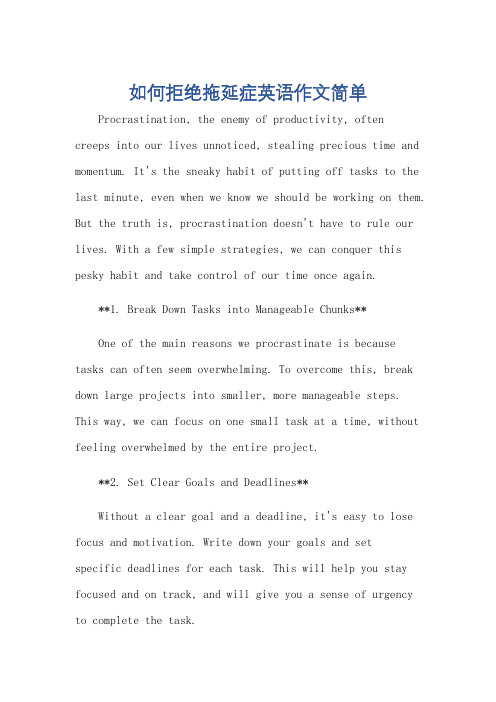
如何拒绝拖延症英语作文简单Procrastination, the enemy of productivity, oftencreeps into our lives unnoticed, stealing precious time and momentum. It's the sneaky habit of putting off tasks to the last minute, even when we know we should be working on them. But the truth is, procrastination doesn't have to rule our lives. With a few simple strategies, we can conquer this pesky habit and take control of our time once again.**1. Break Down Tasks into Manageable Chunks**One of the main reasons we procrastinate is because tasks can often seem overwhelming. To overcome this, break down large projects into smaller, more manageable steps. This way, we can focus on one small task at a time, without feeling overwhelmed by the entire project.**2. Set Clear Goals and Deadlines**Without a clear goal and a deadline, it's easy to lose focus and motivation. Write down your goals and setspecific deadlines for each task. This will help you stay focused and on track, and will give you a sense of urgencyto complete the task.**3. Eliminate Distractions**Distractions are the enemy of concentration. Turn off your phone, close unnecessary tabs on your computer, and create a distraction-free workspace. This will help you stay focused and avoid getting distracted by every little notification or beep.**4. Reward Yourself**Give yourself a small reward each time you complete a task or meet a deadline. This could be anything from a piece of chocolate to a short break. The reward will help motivate you to keep going and will make the task more enjoyable.**5. Develop a Routine**Routines help us create habits and stick to them. Set aside a specific time each day for tasks that require focus and concentration. This could be early in the morning or late at night, depending on when you're most productive.In conclusion, procrastination is a habit that can be overcome with a little effort and dedication. By breaking down tasks, setting clear goals and deadlines, eliminatingdistractions, rewarding yourself, and developing a routine, we can take control of our time and conquer procrastination once and for all. Remember, every task completed is a step towards achieving our goals, so let's stop procrastinating and start achieving!**如何克服拖延症:简单指南**拖延症,这个生产力的敌人,常常在我们不经意间潜入我们的生活,偷走宝贵的时间和动力。
如何克服拖延症的建议英语作文
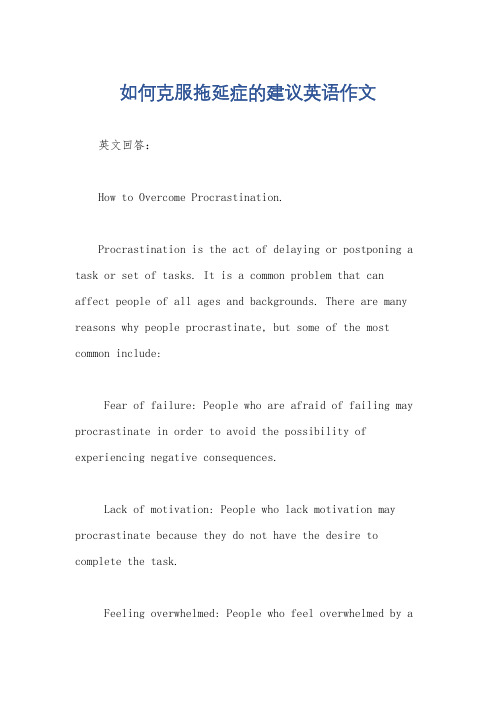
如何克服拖延症的建议英语作文英文回答:How to Overcome Procrastination.Procrastination is the act of delaying or postponing a task or set of tasks. It is a common problem that can affect people of all ages and backgrounds. There are many reasons why people procrastinate, but some of the most common include:Fear of failure: People who are afraid of failing may procrastinate in order to avoid the possibility of experiencing negative consequences.Lack of motivation: People who lack motivation may procrastinate because they do not have the desire to complete the task.Feeling overwhelmed: People who feel overwhelmed by atask may procrastinate because they do not know where to start or how to complete it.Distraction: People who are easily distracted may procrastinate because they have difficulty staying focused on the task at hand.Procrastination can have a number of negative consequences, including:Increased stress: Procrastination can lead to increased stress levels as the deadline for the task approaches.Missed deadlines: Procrastination can lead to missed deadlines, which can have negative consequences for your work or school life.Lower quality work: Procrastination can lead to lower quality work, as you are less likely to put in your best effort when you are rushed.Negative self-image: Procrastination can lead to a negative self-image, as you may start to see yourself as lazy or incompetent.If you are struggling with procrastination, there are a number of things you can do to overcome it. Some of the most effective strategies include:Set realistic goals: When you set unrealistic goals, you are more likely to feel overwhelmed and procrastinate. Instead, break down your task into smaller, more manageable steps.Prioritize your tasks: Decide which tasks are most important and focus on completing those first.Create a schedule: Having a schedule can help you stay on track and avoid procrastination.Find a study buddy: Working with a friend or classmate can help you stay motivated and accountable.Reward yourself: When you complete a task, reward yourself with something you enjoy.Overcoming procrastination is not easy, but it is possible. By following these tips, you can break the cycleof procrastination and start achieving your goals.中文回答:如何克服拖延症。
英语作文-如何克服拖延症
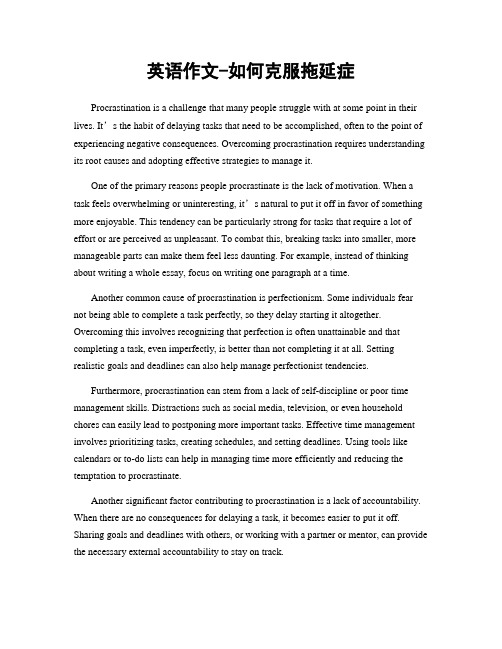
英语作文-如何克服拖延症Procrastination is a challenge that many people struggle with at some point in their lives. It’s the habit of delaying tasks that need to be accomplished, often to the point of experiencing negative consequences. Overcoming procrastination requires understanding its root causes and adopting effective strategies to manage it.One of the primary reasons people procrastinate is the lack of motivation. When a task feels overwhelming or uninteresting, it’s natural to put it off in favor of something more enjoyable. This tendency can be particularly strong for tasks that require a lot of effort or are perceived as unpleasant. To combat this, breaking tasks into smaller, more manageable parts can make them feel less daunting. For example, instead of thinking about writing a whole essay, focus on writing one paragraph at a time.Another common cause of procrastination is perfectionism. Some individuals fear not being able to complete a task perfectly, so they delay starting it altogether. Overcoming this involves recognizing that perfection is often unattainable and that completing a task, even imperfectly, is better than not completing it at all. Setting realistic goals and deadlines can also help manage perfectionist tendencies.Furthermore, procrastination can stem from a lack of self-discipline or poor time management skills. Distractions such as social media, television, or even household chores can easily lead to postponing more important tasks. Effective time management involves prioritizing tasks, creating schedules, and setting deadlines. Using tools like calendars or to-do lists can help in managing time more efficiently and reducing the temptation to procrastinate.Another significant factor contributing to procrastination is a lack of accountability. When there are no consequences for delaying a task, it becomes easier to put it off. Sharing goals and deadlines with others, or working with a partner or mentor, can provide the necessary external accountability to stay on track.Additionally, fear of failure or success can also cause procrastination. Fear of failure can prevent people from starting a task, while fear of success can lead to self-sabotage as the task nears completion. Recognizing and addressing these fears, perhaps through self-reflection or by seeking support from others, is crucial for overcoming them.Moreover, procrastination can be a habit that develops over time and becomes difficult to change. Like any habit, breaking it requires awareness and persistence. Developing a routine and sticking to it can help to establish new, healthier habits. For example, setting aside a specific time each day for difficult tasks can help build momentum and reduce the urge to procrastinate.Ultimately, overcoming procrastination is about developing self-awareness and taking proactive steps to manage time and tasks effectively. By understanding the reasons behind procrastination and adopting strategies to address them, individuals can increase productivity, reduce stress, and achieve their goals more consistently.In conclusion, while procrastination is a common issue, it is not insurmountable. By implementing strategies such as breaking tasks into smaller steps, managing time effectively, seeking accountability, and addressing underlying fears, individuals can overcome procrastination and achieve success in both their personal and professional lives. The key lies in taking the first step and committing to making positive changes.。
怎么打败拖延症英语作文
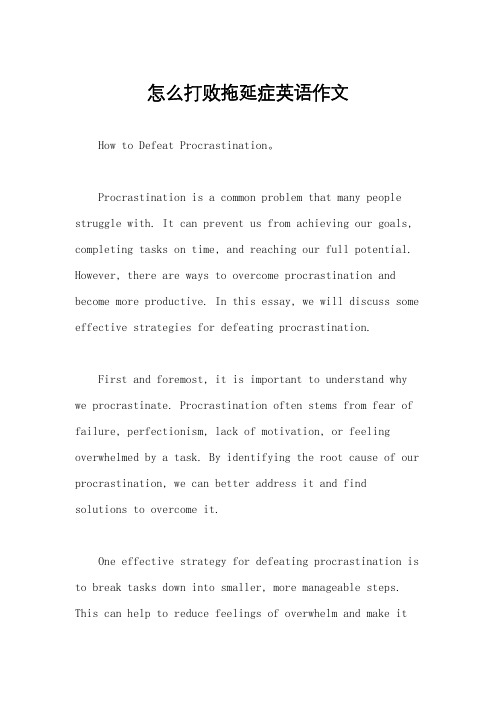
怎么打败拖延症英语作文How to Defeat Procrastination。
Procrastination is a common problem that many people struggle with. It can prevent us from achieving our goals, completing tasks on time, and reaching our full potential. However, there are ways to overcome procrastination and become more productive. In this essay, we will discuss some effective strategies for defeating procrastination.First and foremost, it is important to understand why we procrastinate. Procrastination often stems from fear of failure, perfectionism, lack of motivation, or feeling overwhelmed by a task. By identifying the root cause of our procrastination, we can better address it and findsolutions to overcome it.One effective strategy for defeating procrastination is to break tasks down into smaller, more manageable steps. This can help to reduce feelings of overwhelm and make iteasier to get started. By setting small, achievable goals, we can build momentum and keep moving forward.Another helpful strategy is to create a schedule or to-do list and prioritize tasks based on their importance and deadlines. By organizing our tasks and setting specific deadlines, we can create a sense of urgency and motivation to get things done.It is also important to eliminate distractions and create a conducive work environment. This may involve turning off notifications on our phone, finding a quiet place to work, or setting specific work hours. By minimizing distractions, we can focus better and be more productive.Furthermore, it can be helpful to reward ourselves for completing tasks and meeting deadlines. By setting up a system of rewards, such as a break, a treat, or a fun activity, we can motivate ourselves to stay on track and avoid procrastination.In addition, it is important to practice self-discipline and develop good habits. This may involvesetting boundaries, saying no to distractions, and holding ourselves accountable for our actions. By cultivating self-discipline, we can become more proactive and less prone to procrastination.Finally, it is important to practice self-care and prioritize our well-being. This may involve getting enough sleep, eating healthily, exercising regularly, and taking breaks when needed. By taking care of ourselves, we can improve our focus, energy levels, and overall productivity.In conclusion, procrastination is a common problem that can hinder our progress and success. However, by understanding the root causes of procrastination and implementing effective strategies, we can defeat procrastination and become more productive. By breaking tasks down, creating a schedule, eliminating distractions, rewarding ourselves, practicing self-discipline, and prioritizing self-care, we can overcome procrastination andachieve our goals. Remember, it is never too late to start defeating procrastination and taking control of our lives.。
如何停止拖延英语作文
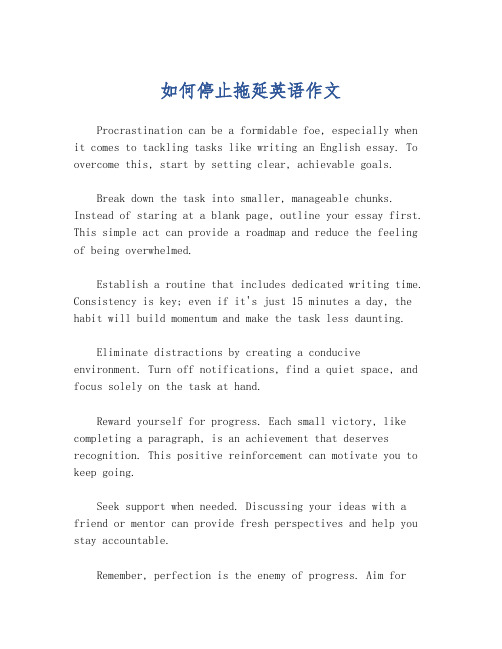
如何停止拖延英语作文Procrastination can be a formidable foe, especially when it comes to tackling tasks like writing an English essay. To overcome this, start by setting clear, achievable goals.Break down the task into smaller, manageable chunks. Instead of staring at a blank page, outline your essay first. This simple act can provide a roadmap and reduce the feeling of being overwhelmed.Establish a routine that includes dedicated writing time. Consistency is key; even if it's just 15 minutes a day, the habit will build momentum and make the task less daunting.Eliminate distractions by creating a conducive environment. Turn off notifications, find a quiet space, and focus solely on the task at hand.Reward yourself for progress. Each small victory, like completing a paragraph, is an achievement that deserves recognition. This positive reinforcement can motivate you to keep going.Seek support when needed. Discussing your ideas with a friend or mentor can provide fresh perspectives and help you stay accountable.Remember, perfection is the enemy of progress. Aim forprogress, not perfection. It's better to produce a rough draft than to delay indefinitely.Finally, reflect on why you procrastinate. Understanding the root cause can help you address it directly and develop strategies to prevent it in the future.By implementing these steps, you can gradually conquer procrastination and improve your writing process in English.。
大学生如何摆脱拖延症英语作文
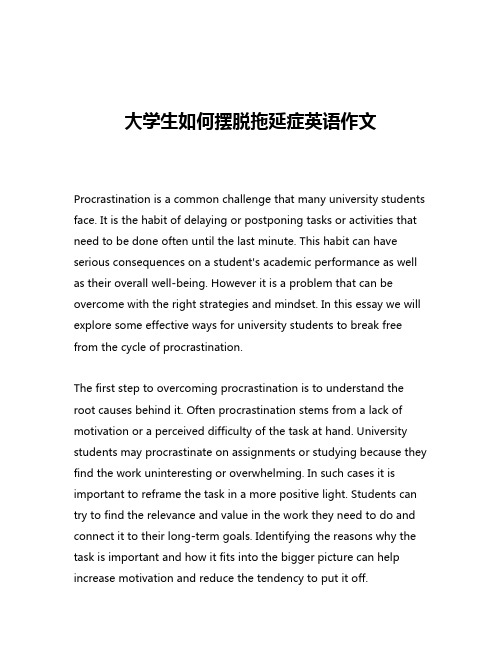
大学生如何摆脱拖延症英语作文Procrastination is a common challenge that many university students face. It is the habit of delaying or postponing tasks or activities that need to be done often until the last minute. This habit can have serious consequences on a student's academic performance as well as their overall well-being. However it is a problem that can be overcome with the right strategies and mindset. In this essay we will explore some effective ways for university students to break free from the cycle of procrastination.The first step to overcoming procrastination is to understand the root causes behind it. Often procrastination stems from a lack of motivation or a perceived difficulty of the task at hand. University students may procrastinate on assignments or studying because they find the work uninteresting or overwhelming. In such cases it is important to reframe the task in a more positive light. Students can try to find the relevance and value in the work they need to do and connect it to their long-term goals. Identifying the reasons why the task is important and how it fits into the bigger picture can help increase motivation and reduce the tendency to put it off.Another common cause of procrastination is poor time management. When students feel like they have plenty of time to complete a task they are more likely to delay starting it. However this can quickly spiral out of control as the deadline approaches. To combat this university students should create a detailed plan and timeline for their work. Breaking down larger assignments into smaller manageable steps can make the work feel less daunting. Scheduling specific times to work on different aspects of the task and sticking to that schedule can also be very effective. Using a calendar or to-do list to stay organized and on track is highly recommended.Procrastination is also closely linked to perfectionism. Some students may avoid starting a task because they are worried about doing it perfectly the first time. They may spend excessive time agonizing over every detail instead of just getting started. This tendency can be detrimental as it prevents any real progress from being made. University students should try to adopt a more flexible and forgiving mindset when it comes to their work. Accepting that perfection is rarely achievable and that some mistakes are inevitable can help reduce the urge to procrastinate. Focusing on doing their best rather than being perfect can go a long way.In addition to managing time and adjusting mindset students should also consider their physical and mental wellbeing when trying toovercome procrastination. Factors such as lack of sleep stress and poor diet can all contribute to decreased motivation and focus which in turn can lead to procrastination. Establishing healthy habits like getting enough sleep exercising regularly and eating nutritious foods can provide the energy and clarity of mind needed to tackle tasks in a timely manner. Taking regular breaks to recharge and avoid burnout is also crucial.Finally university students should not be afraid to seek support when needed. Procrastination can be a deeply ingrained habit that is difficult to break on one's own. Speaking to academic advisors professors or counselors can provide valuable guidance and accountability. Joining study groups or finding an accountability partner can also be very helpful. Having someone else check in on progress and provide encouragement can make a big difference.In conclusion procrastination is a challenge that many university students face but it is one that can be overcome. By understanding the root causes addressing time management issues adjusting mindset and taking care of physical and mental health students can break free from the cycle of procrastination. With the right strategies and support in place university students can develop the discipline and motivation needed to succeed academically. Overcoming procrastination requires effort and consistency but the benefits interms of improved grades reduced stress and greater sense of accomplishment make it well worth the investment.。
不想写作业英语口语怎么办
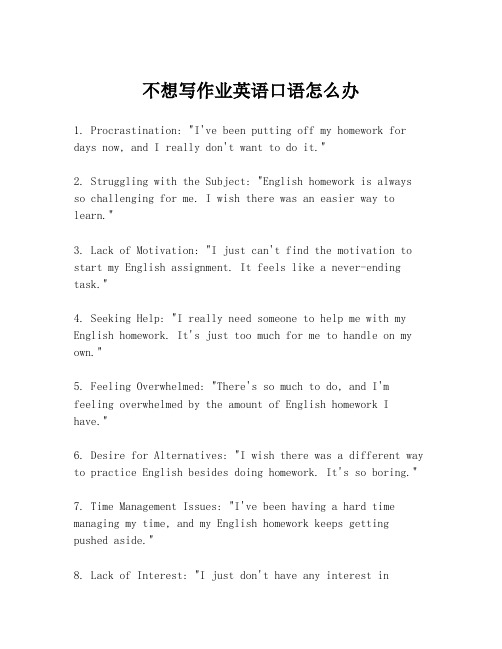
不想写作业英语口语怎么办1. Procrastination: "I've been putting off my homework for days now, and I really don't want to do it."2. Struggling with the Subject: "English homework is always so challenging for me. I wish there was an easier way to learn."3. Lack of Motivation: "I just can't find the motivation to start my English assignment. It feels like a never-ending task."4. Seeking Help: "I really need someone to help me with my English homework. It's just too much for me to handle on my own."5. Feeling Overwhelmed: "There's so much to do, and I'm feeling overwhelmed by the amount of English homework I have."6. Desire for Alternatives: "I wish there was a different way to practice English besides doing homework. It's so boring."7. Time Management Issues: "I've been having a hard time managing my time, and my English homework keeps getting pushed aside."8. Lack of Interest: "I just don't have any interest inEnglish. It's not a subject I enjoy, and that makes the homework even harder."9. Feeling Frustrated: "I'm so frustrated with my English homework. I've been trying for hours, but I can't seem to get it right."10. Need for a Break: "I think I need a break from my English homework. I'm feeling burnt out and need some time to recharge."11. In Search of Inspiration: "I'm looking for some inspiration to get started on my English assignment. Any suggestions would be great."12. Feeling Stuck: "I'm stuck on my English homework, and I don't know what to do. I could really use some guidance."13. Desire for a Change: "I wish there was a change in the way we do English homework. It's not engaging at all."14. Need for Support: "I need some support to get through my English homework. It's tough going it alone."15. Feeling Disheartened: "I'm feeling disheartened by the amount of English homework I have. It's just too much."Remember, it's important to find ways to make the process of doing homework more enjoyable. Try breaking it down into smaller tasks, setting specific goals, and rewarding yourself for completing each part. If you're struggling withunderstanding the material, consider seeking help from a tutor or a classmate.。
战胜拖延症
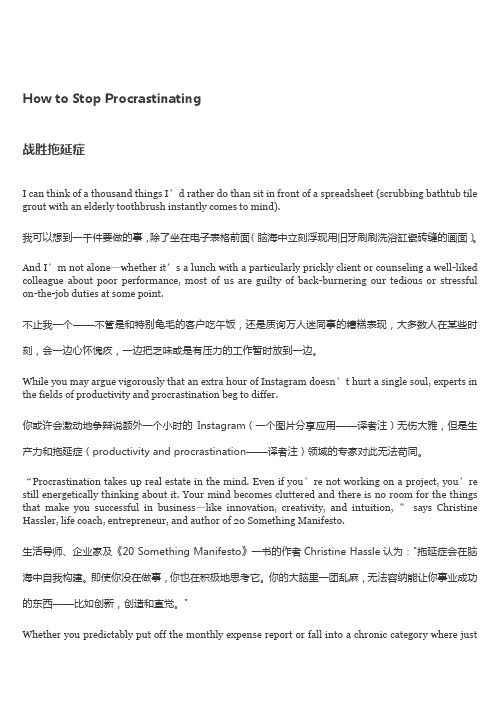
How to Stop Procrastinating战胜拖延症I can think of a thousand things I’d rather do than sit in front of a spreadsheet (scrubbing bathtub tile grout with an elderly toothbrush instantly comes to mind).我可以想到一千件要做的事,除了坐在电子表格前面(脑海中立刻浮现用旧牙刷刷洗浴缸瓷砖缝的画面)。
And I’m not alone—whether it’s a lunch with a particularly prickly client or counseling a well-liked colleague about poor performance, most of us are guilty of back-burnering our tedious or stressful on-the-job duties at some point.不止我一个——不管是和特别龟毛的客户吃午饭,还是质询万人迷同事的糟糕表现,大多数人在某些时刻,会一边心怀愧疚,一边把乏味或是有压力的工作暂时放到一边。
While you may argue vigorously that an extra hour of Instagram doesn’t hurt a single soul, experts in the fields of productivity and procrastination beg to differ.你或许会激动地争辩说额外一个小时的Instagram(一个图片分享应用——译者注)无伤大雅,但是生产力和拖延症(productivity and procrastination——译者注)领域的专家对此无法苟同。
HowtoOvercomeProcrastination
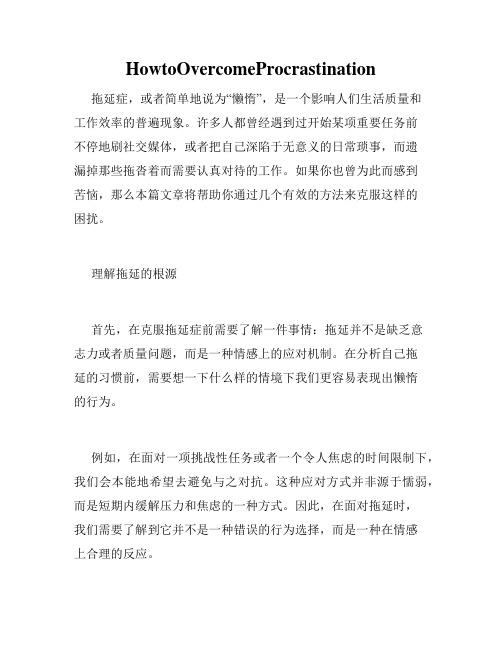
HowtoOvercomeProcrastination 拖延症,或者简单地说为“懒惰”,是一个影响人们生活质量和工作效率的普遍现象。
许多人都曾经遇到过开始某项重要任务前不停地刷社交媒体,或者把自己深陷于无意义的日常琐事,而遗漏掉那些拖沓着而需要认真对待的工作。
如果你也曾为此而感到苦恼,那么本篇文章将帮助你通过几个有效的方法来克服这样的困扰。
理解拖延的根源首先,在克服拖延症前需要了解一件事情:拖延并不是缺乏意志力或者质量问题,而是一种情感上的应对机制。
在分析自己拖延的习惯前,需要想一下什么样的情境下我们更容易表现出懒惰的行为。
例如,在面对一项挑战性任务或者一个令人焦虑的时间限制下,我们会本能地希望去避免与之对抗。
这种应对方式并非源于懦弱,而是短期内缓解压力和焦虑的一种方式。
因此,在面对拖延时,我们需要了解到它并不是一种错误的行为选择,而是一种在情感上合理的反应。
避免自我批评一个常见的陷阱是在自己为什么不能更高效地完成任务而感到愧疚。
在这种情况下,我们经常把自己的缺点作为批评的标准,而不是试图找到真正困难的根本原因。
因此,当意识到自己的拖延时,不要用自我批评的方式来贬低自己,试图寻求了解背后的原因,并试图找到应对的办法。
这样会让我们更能理解自己的习惯,并且更容易克服自己的拖延问题。
规划和计划其次,把实际行动与计划制定联系在一起,是克服拖延的一个有效方法。
当我们需要开始一个任务时,我们通常感到压力和不安,因为我们并不知道该从何处开始,或者这项工作是否符合预期。
因此,一旦开始制定任务计划,就能够让我们感觉到自己有可行的方法来开始完成工作。
计划极具启发性,能够帮助我们更精确地了解自己接下来需要做什么,并且也能24小时默默地保持工作进程的动态。
打破大任务成小任务另一个有效的拖延克服方法是把工作大任务分割成更小的任务,然后集中精力逐步完成这些小任务。
这种从小到大、逐步完成的过程,是一种内化并珍视事情的良好习惯,同时也增强了自身的成就感。
新生代英语高级教程2Unit1_电子教案

教案课程名称新生代英语高级教程2课时班级专业教师系部教研室教材《新生代英语高级教程2》1教学计划教学单元单元主题教学内容Unit 1 “My schedule is crazy”.StudyingShow Time“ My schedule is crazy.”ReadingHow to stop procrastinating?Chat TimeI aced my chemistry test.WritingA scheduleGrammarTagquestionsMy StorySchedules and routines课时8安排教学目标Warm-up To get students to talkabout the main topic ofthis unit in acomfortable andrelaxed manner教学活动建议Focus students’ attention onlearningthegoals for the unit and explain that thefocus of this unit is on time management.Ask students to look at the picture and todescribe what they see. (A student isworking on an assignment very late atnight. ) Read the words in the boxes aloud,modeling the correct pronunciation andeliciting their meanings. Give studentsseveral minutes to complete the passage.2Vocabulary Builder A and BTo teach students newvocabulary related tostudyingCTo improve studentslistening andcomprehension skillsNominate students to read the passagearound the class. Ask students: Do youhave a schedule as busy as this? What ’ s yourschedule like?Have students listen and repeat the wordsand the expression, teaching thedefinition for each one. You can checktheir comprehension by asking questions,such as: What is another word forhomework? (assignment) What is the verbwe use to describe missing a class? (skip)What is another word for studentaccommodation? (dormitory )Once students seem comfortable with thenew words and the expression, have themcomplete Exercise B and then switchbooks. Go through the answers, calling ondifferent students each time. Correct anyerrors.If you want to, you can start eachclass with a short spelling test, whichworks quite well as a warm-up.Tell students they will hear a conversationbetween a man and a woman who are’discussing their semester schedules. Thereare a few words in the conversation youmay need to teach. They are physics,elective and Shakespeare. Write thesethree words on the blackboard. Askstudents: Which one is a famous writer?(Shakespeare) You can also ask studentsto tell you the names of some famousShakespeare plays. Then ask students:Which one is a kind of science? ( physics)You may want to add that Newton is themost famous figure in the history of physics.Students will probably have heard of thestory of an apple falling on his head.Tell students that we use elective to talkabout subjects that we choose. Askstudents if they have any elective classes.Play the audio, twice if necessary. Pausethe audio so that students have time to fill3DTo improve studentsspeaking andcomprehension skillsShow Time ATo teach studentsspeaking skillsthrough the use ofpicturesB, C and DTo improve studentslisteningcomprehensionthrough the use ofvideoReading A and BTo improve studentsreadingin the blanks.Read the rubric aloud and checkthat students understand the task.’Organize students into pairs. Challengethem to see who can be the first tocomplete the puzzle, but don ’ t allow fast finishersto reveal their answers to their classmates.As a possible extension task, get studentsto write sentences about themselvescontaining the words from this activity. Tellstudents to look at the pictures and asksome basic comprehension questions,such as: Who are these people? Whereare they? What are they doing?Ask students to guess what happened inthis video and to match the pictures to thesentences according to their ownunderstanding.Have students watch the video in itsentirety. Ask them to check theiranswers with a partner.For Exercise B, ask students to readthrough each statement and to decide if it’is true or false.For Exercise C, play the video again. Havea pair of students read out the conversationwith one student playing the role of Hectorand the other as Naomi. For an extensionactivity, you can also have studentsrewrite the conversation, using the wordsand expressions learned in this unit.For Exercise D, have students readthrough each sentence and choosethe correct word or expression.Check the answers for Exercises B, C, andD. Students can exchange books and listenas you go through the answers.Exercise AAsk students to describe the picture. Then’read the headline aloud. If students don ’ t know themeaning of the word4comprehensionC, D and ETo review the useful words and expressionsprocrastinating , tell them to guess whatthey think it means. Elicit thatprocrastinate means putting off doingsomething until a later date. Ask studentsto tell you whether or not theyprocrastinate and get them to describethe situations in which they are most likelyto procrastinate.Give students several minutes to read thetext. Encourage students to refer toWORDS & EXPRESSIONS.Ask students to complete the exercise.Allow them to check their answers with apartner before conducting class feedback. Exercise BGet students to look at the statements.They should then read the text again, anddecide whether the statements are true orfalse.Check answers around the class. Exercise CChallenge students to see who can bethe first to match the words to thedefinitions. Fast finishers should writesentences containing the words in the leftcolumn. They should then blank out thewords and read the sentences aloud toanother fast finisher, who should listenand provide the missing words.Check answers orally, focusing on correctpronunciation of the words.Exercise DRead the words and expressions in theboxes aloud. Ask students to complete thesentences. Allow them to check theiranswers with a partner before reading thesentences around the class.Personalize the new language by askingstudents questions, such as: What best-selling books have you read? When youmake a plan, do you find it difficult to stickto it? When were you last tempted toprocrastinate?5Beyond the TextTo improve studentscritically thinkingability and encouragethem to learn a lessonfrom the textChat Time To improve studentslistening, speaking,writing and actingskills through the useof conversationExercise EFocus students ’ attention on the Bingo gridand check that they understand the rules ofthe game.Ask students to write the words into theblanks.When everyone is ready, play the audioof the definitions.When someone calls out“ Bingo” , see if he/she can remember the definitions for thewords in their row.Exercise ARead what Olivia says to the class. Then’get a student to read the advice aloud. Askstudents whether or not they agree with theadvice, and whether they have anydifferent or better suggestions.Focus students on what Nick says.Organize students into pairs and get themto discuss what advice they would giveNick. After they have shared their ideas,get a few students to report back.Encourage the rest of the class to givefeedback on each other’ s advice. Exercise BGive students several minutes to read thequotes and sayings. Allow them to askquestions about any new or unfamiliarwords.Organize students into pairs to completethe task. Monitor as students share theirideas, offering support where necessary. Exercises’ A & BFor Exercise A, explain to students thatthey will hear a conversation in which aman and a woman discuss midterm tests.Introduce the key words and expressionsfor this conversation.Tell students to listen carefully and to writedown what they hear in the blanks. Ifnecessary, pause the audio so that studentshave time to write.Have students practice talking about6Writing To improve studentswriting skills and learnto write a schedulestudying using the questions in Exercise B.Have students read through LANGUAGENOTE, which teaches the idiom “to turnover a new leaf. Ask students: Have youever turned over a new leaf? What did youwant to change? Were you successful?Why (not)?Exercise CRead the rubric aloud and direct students’attention to the clues. As a class, readthrough the expressions in Usefullanguage, focusing on the correctpronunciation, sentence stress andintonation.Organize students into pairs and get themto work on their role-plays. Circulate asstudents do this, listening and makingnotes of any examples of good languageyou hear or any issues students need helpwith.Nominate a couple of confident pairs toperform their role-plays to the rest of theclass. Conduct class feedback, taking timeto discuss any issues you have observedand any examples of good language andcommunicative skills.Exercise’ATell students that they are going to putsome of the skills they have learned in thisunit into practice, by writing a schedule.Give students several minutes to skim thenotes and to match them to the scheduleentries.Allow students to check their answers witha partner before conducting classfeedback.Exercise BFocus students’ attention on the headingsand elicit their meanings.Read the rubric aloud and challengestudents to see who can be the first tocomplete the task.Check answers orally. For each heading,7Grammar To teach students howto use tag questionsask students to suggest a couple morepossible schedule entries.Exercise CGet students to look at Kara’ s schedule.Read the rubric and make sure studentsknow they should only write the mostimportant information.Do the first schedule entry in Exercise Btogether, as an example. Students shouldcomplete the rest of the task alone.Monitor, offering support wherenecessary.Bring the class together again. Go throughthe schedule, asking students to tell youwhat they wrote and where they wrote it. Exercise DAsk students: What do you need to do thisweek? Ask them about their daily life,school and their part-time job. Tellstudents about some of the things you needto do this week.Get students to make notes under theheadings. Ask a couple of students toreport back on what they have written.Exercise EGet students to put their notes intothe schedule. Remind them that theyonly need to write the most importantinformation.Monitor as students complete the task,offering support where necessary. Whenstudents have completed the task, displaythe schedules on the screen and getstudents to look at each other ’ s schedule. Askstudents: Who has the busiestschedule?Exercise AStart by explaining that tag questions areused in two situations. In the first situation,you are not sure something is true, butwant to make sure. In this case when youspeak, your voice will rise. Write anexample on the blackboard, such8as: You aren ’ t my student, are you?↗Explain that we also use tag questionswhen we want to confirm something weknow is true.In this case, your voice will go down whenyou speak. Write an example on theblackboard, such as: You don’ t have asister, do you? ↘Once students seem comfortable with thegrammar, have them complete the exerciseand then switch books to correct theirmistakes.Exercise BAsk students to look at the picture and todescribe what they see. (A sleepy boy whois finding it difficult to get up for school.His mom is making breakfast for him.)Elicit when we use tag questions. (Whenwe want to check conversation or elicit aresponse from our conversational partner.)Read the rubric aloud. Complete the firsttag question together with students as anexample.Get students to complete the rest of theconversation. Allow them to check theiranswers with a partner before choosingtwo confident students to read theconversation aloud to the rest of the class.9My Story To improve studentslisteningcomprehension andspeaking abilitythrough the use ofvideo Exercises’ A & BTell students that they will see a video inwhich real people talk about what theydo in their free time.Play the video and have studentscomplete the true or false statements inExercise A. In some cases, you may needto pause the video to help students.Have students tell you the answers,correcting any mistakes. Play the videoagain and have students answer thequestions in Exercise B, pausing the videoif necessary.Check students ’ answers, correcting anymistakes.Exercise CGive students several minutes to read thequestions and to think about their answers.Organize students into pairs. They shouldtake it in turns to ask and answer thequestions.Circulate, encouraging students to usesome of the new words and expressionsthey have learned in this unit.Ask a few students to report back on theirdiscussions. Write down any newlanguage on the blackboard.课后学习设计作业Finish all the exercises in Unit 1.Read the text in this unit again and try tosummarise its content.Write a schedule.课后总结与反思10补充教学资源Vocabulary Builder参考译文蒂姆:嗨,希拉里。
- 1、下载文档前请自行甄别文档内容的完整性,平台不提供额外的编辑、内容补充、找答案等附加服务。
- 2、"仅部分预览"的文档,不可在线预览部分如存在完整性等问题,可反馈申请退款(可完整预览的文档不适用该条件!)。
- 3、如文档侵犯您的权益,请联系客服反馈,我们会尽快为您处理(人工客服工作时间:9:00-18:30)。
How Not to Procrastinate
1.Don't plan to procrastinate.This is #1 for a reason: it's
such a simple way to solve such a common problem! If you find
yourself saying things like "I can't do (insert activity) that night; I'm
going to be up all night writing a paper," you are one hard-core
procrastinator. Why? Because you're actually planning to procrastinate
-- which shows that you can plan. Which also shows, therefore, that
you can plan not to have to be up super late every night before you
have something major due.
2.Break things down. Divide things into smaller projects: coming up with a
thesis/topic/etc.; doing the first part of the research; testing your results/writing a rough draft;
finishing up everything but a few minor details a few days before your deadline. Breaking things down into smaller projects not only makes your workload easier to manage, but also makes it nearly impossible to leave it all to the last minute.
3.Set earlier deadlines for yourself.Is your paper due on the 15th? Get (not try,
but actually get) it done by the 12th. You'll have time to really focus; spend thoughtful time putting your work together; get it read over by a TA, your professor, or an academic support center in advance; and, you know, deal with the unexpected roommate drama you'll have to deal with the night of the 14th, too.
4.Find a way to hold yourself accountable.Accountability can
go a long way when it comes to avoiding procrastination (and breaking your
procrastination habits in general). Find another friend -- in the same class, in
your residence hall, in a club you're in -- and hold each other accountable for
getting your project done earlier than usual. Come up with some kind of
reward system if you get your projects done early as well as some kind of
"punishment" system if you aren't keeping on track.
5.Work with a friend. Working with a friend (who you really can
study/work with, not just end up hanging out and talking with) can help
streamline your efforts and make you really focus on the assigned task at hand.
You can check in with each other about the progress you're making and
schedule time to work on your projects together. It's much harder to break a
study/work meeting with someone else than it is to break one with yourself.
6.Start small.Don't expect to change all of your procrastination habits in one week.
Try to teach yourself how not to procrastinate in, for example, only 1 or 2 of your courses this term. Smaller habits are easier to stick with an make permanent on a larger scale.
7.Be patient with yourself.Just like any bad habit, learning how not to
procrastinate takes time (ironically!). Being patient with yourself and staying committed to not procrastinating in the long term is part of the process, too.
8.Get extra help if you need it.Procrastination is often very isolating: you are
up late, alone, working on your paper or report, for example. But incorporating help from others into your planning process is a great way to learn how not to procrastinate. An appointment you have at an academic writing center, for example, will help make your paper better, can provide needed mentoring about avoiding procrastination in the first place, and will help hold you accountable. After all, you're not in college to work by yourself all the time, right? Take advantage of what your school has to offer.。
